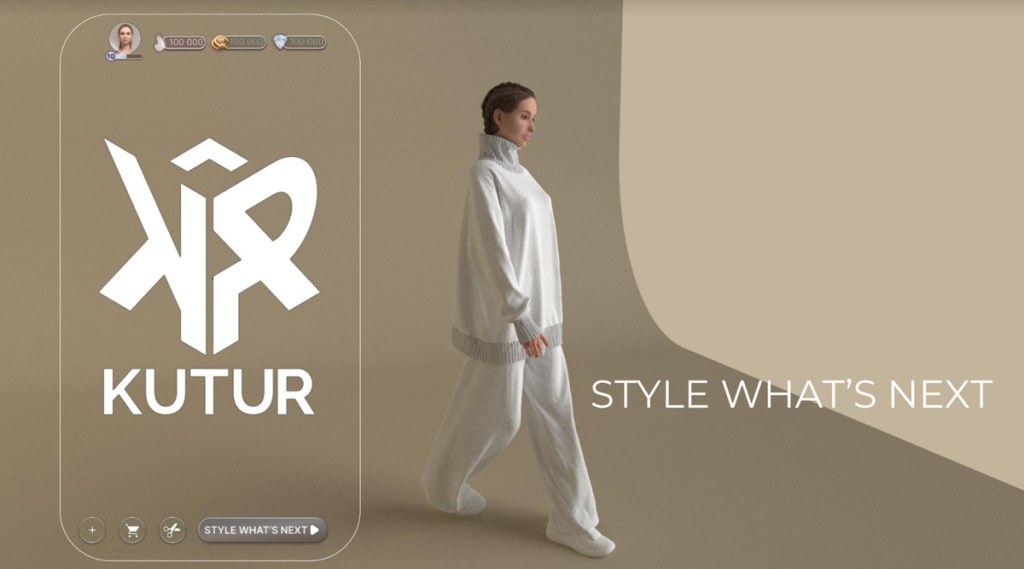Vizta DGTL aims to bring realistic graphics and RPG gameplay to Kutur Runway fashion game

Vizta DGTL, a game studio based in Berlin, hopes to set the fashion world ablaze with Kutur Runway, a fashion game that embraces role-playing game mechanics, social platforms and realistic 3D graphics.
The Berlin company believes the market opportunities created by early fashion games like Covet Fashion will become bigger with a fresh take — such as a social platform and a more modern approach to gaming, said founder Nicola Mizon and CEO Tung Nguyen-Khac in an interview with GamesBeat on a recent trip to Riyadh.
“It’s a lifestyle-driven platform. We start with a fashion game that combines strategy and RPG elements,” Nguyen-Khac said.
Vizta Digital plans to release its mobile-first product in 2025. The game will have the seamless integration of RPG mechanics, competitive styling and an innovative monetization system. The game is in alpha testing now and it is working toward a full launch in the middle of next year, Nguyen-Khac said.
Mizon, founder, said in our chat, “We’re creating a fashion game project at the intersection of technology, fashion, games and commerce. So the hypothesis is that women are underserved in the game market. This is something that everyone knows, and we know that the majority of people playing games on mobile are females. We want to make games for women designed by women.”
Mizon said the flagship product, Kutur Runway, will be a mobile game that merges high-end fashion withimmersive 3D gameplay, creating a platform at the intersection of two multi-billion-dollar industries: fashion and gaming.
“We think there’s definitely a need for more fashion gaming products. So what we wanted to create was a big product that brings all of these components together and really innovates in the space. You’ve played fashion games before, like Covet Fashion. But we wanted to create something that will innovate in two ways. One is with the visuals. So really having visuals that stand out, and I’m trying to so really have visuals that have that level of fidelity that will really appeal to the B2B audience as well.”
The leaders have both fashion game experience and fashion industry expertise, and they hope to wow fashion enthusiasts by bringing together different brands across the space. They also want to enlist help from creators and fashion celebrities.
Blending worlds
At its core, Kutur Runway merges RPG mechanics with a dynamic fashion world, allowing players to script their fashion legacy through head-to-head Style Trials. These trials transform the runway into a battleground where creativity reigns supreme, challenging players to craft stunning ensembles and outshine rivals in themed challenges.
The company has a small internal team and a number of contractors. In that sense, it’s a lean operation. The team has experience from brands such as Disney, Sony, Universal, Amazon, Nickelodeon, Agatha Christie, and Luc Besson, Vizta DGTL is dedicated to pushing the boundaries of gaming and delivering quality experiences to players worldwide. The company is targeting players from Gen Z to young adults (ages 15 to 35 years old).
The team hopes to set Kutur Runway apart by embracing a forward-thinking fashion perspective, developed by gamers to ensure an immersive and inclusive journey that seamlessly merges fashion andgaming. Leveraging advanced technology, including AI and web3 components, the game introduces a new level of interactivity and possibilities.
Additionally, through Web3 integration, Kutur Runway pioneers unique ownership and trading opportunities for in-game fashion assets, reshaping the landscape of digital collectibles and enhancing player engagement.
In addition to its creative features, Kutur Runway prioritizes inclusivity and diversity, ensuring every player feels represented, safe, and encouraged. This commitment extends to empowering players through intuitive creator tools, utilizing AI to unlock unprecedented creative opportunities in designing garments. With these tools, players can push the boundaries of user-generated content, shaping a fashion landscape that reflects the richness and diversity of their imagination.
Players can collect garments with unique stats and rarity levels through various means such as crafting, purchasing in-game, or via partner marketplaces. Style Trials allow players to showcase their skills by creating looks that fit the presented criteria, with garments judged based on overall subjective appeal and given scores based on their “power.”
And players will have the capability to directly share their creations on their social media platforms such as TikTok and Instagram, empowering them to use their designs for content creation and further amplifying their influence in the fashion community beyond the game.

“You have to go somewhere where the audience is, especially the audience for tomorrow,” Nguyen-Khac said. “Gaming is actually one of the platforms where it makes so much sense. If we think bigger than a game, and think about a platform, then the opportunity moves beyond just one experience.”
Nguyen-Khac added, “We can create multiple experiences, and create this overarching platform where we can engage players with experiences around” a variety of fashion games under the lifestyle umbrella.
There is still some hope that metaverse experience will be driven by fashion. Tung believes metaverse-like games have existed for years in the form of massively multiplayer online games, where the social platform is key to holding on to the audience.
“We want to focus on making sure that the core experience, the technology, is where it needs to be,” Tung said.
It aims to have in-game purchases, VIP memberships, advertising and sponsorships, Web3 digital item trading and a second-hand marketplace.
The purpose of the game for the player is to become the most famous and influential fashion designer and stylist in the Kutur universe, all while expressing personal creativity, mastering fashion trends, and competing with or collaborating with others. One vs one or in groups vs groups. The player’s journey is one of growth, both in terms of skill and social influence, culminating in becoming a trendsetting icon in the game’s world.
The storyline of Kutur Runway is designed to take the player on a journey from being a local, fashion-obsessed individual to becoming a globally renowned fashion influencer. Set in a visually stunning, high-fashion digital world, the player starts out as a fresh face in the fashion scene, entering competitions, working on their style, and progressively leveling up their fashion skills and influence.
Throughout the game, players meet influential in-game characters, including other fashion influencers, designers, and even rivals, who challenge their style and creativity.
There could be some user-generated content. Some brands might be OK with that, but others may shy away from it. The company will focus on where the brands are comfortable.
The storyline unfolds through fashion challenges, quests, and interactions with these characters, each of which pushes the player toward greater mastery in the fashion world. The player navigates this world while building their personal brand, unlocking prestigious partnerships with real-world fashion brands, and gaining followers as they rise through the ranks.
Kutur’s planned AI-powered fashion creator tool will democratize fashion design by allowing players to create custom pieces without formal fashion education. This powerful feature will enable everyone to become a virtual fashion designer, fostering creativity and accessibility.
Partnerships

Vizta Digital was founded in Berlin in 2023 by Mizon, Matthias Meyer-Lutterloh and Nguyen-Khac. The combination of gaming and fashion expertise is paying off in partnerships.
Meyer-Lutterloh is an accomplished fashion and lifestyle and interior design designer. He worked on collections for prestigious brands including Bogner, Miss Sixty, Calvin Klein, Armani, Jean-Paul Gaultier, and Zara.
And Vizta DGTL has partnerships with Vogue in Singapore, Sleek Media, Fashion.tv, TheSoul Publishing and Donald Schneider, a fashion innovation and collaboration expert, with experience in high-profile fashion projects and partnerships at Vogue Paris, H&M, and Karl Lagerfeld.
The partnerships with fashion designers and entertainers are meant to bring together fashion, music and lifestyle brands together. It also plans to partner with influencers and creators and the company hopes to partner with top model franchises and put models in the game that look realistic.
The company said it values sustainability, diversity, inclusivity and platforms that can scale. Leading fashion houses are showing interest for in-game collaborations, and the company believes it can move into related verticals too.
Funding and origins

The initial funding of around $1.5 million came from angels, Sisu Game Ventures, and Lyrik Ventures. It also received grants from Medienboard Berlin-Brandenburg (which finances films) and the Near Foundation. Angels included Mike Lee (founder of MyFitnessPal and former chief digital officer of Under Armour) and Heiko Hubertz (founder of Bigpoint, among others). The first round came in more than a year ago.
Vizta Digital has an experienced founding team consisting of Nicola Mizon, Matthias Meyer-Lutterloh and Tung Nguyen-Khac. Together, they combine many years of expertise in the fashion world as well as in game development, game publishing and distribution and live game operations.
For example, Matthias Meyer-Lutterloh has worked as a fashion designer with renowned brands such as Bogner, Max Mara, Jean Paul Gaultier, Miss Sixty and Calvin Klein. He is also a sought-after expert in the Web3 environment and is currently Head of NFT at the European Blockchain Association.
Web3 technologies are also used to enable digital ownership and the sharing of designed fashion items. It can offer players ownership of exclusive digital fashion items, adding real-world value to virtual collections.
Insights from years ago

Nicola Mizon founded the company in 2023. But while the company is young, the team collected insights from years ago. Mizon had experience at both Spil Games and Aeria Games. Nguyen-Khac was the CEO at Spil Games, Aeria Games and Pro7Sat1.Games. He was also managing partner at Bigpoint and strategic adviser to Deca Games and Kongregate.
At Spil Games, Nguyen-Khac oversaw an operation with 300 million monthly active users, and about 60% were females playing dress-up and makeover games. The quality of the old Flash games wasn’t that good, but there was a lot of engagement nevertheless.
“We think that there is a huge gap that needs to filled because the market is so underserved and the technology has come so much further,” Nguyen-Khac said. “It’s more important for the fashion brands as a platform to be there. It’s a perfect moment where things are coming together, and where it makes more sense to be in the market where there are 3.5 billion players and 1.2 billion of them are female. About 60% of them are interested in fashion. That’s a very good foundation.”
There are a lot of hypercasual games in the category, but much of the titles are dress-up or makeover games.
“There was a moment where we saw adult women have the desire for the games, but they’re playing these hyper casual dress up and makeover games because there’s nothing else out there in the market for them,” Mizon said.
The competition
Brands want to move into gaming and they’re getting into Roblox and Fortnite.
“But some brands don’t want to look like either Roblox or Fortnite. They want to look good and luxurious. So that’s one of the aspects where we wanted to innovate. We want to push, first of all, mobile technology to make a beautiful game for women. And then we wanted to also have the core gameplay itself that delivers a familiar dress up experience that we know women love,” she said.
“But we want to innovate on the meta gameplay. Really add layers of meta gameplay. So we know women like that because you’ve seen how doing that disrupted the match-3 space. The team will add RPG features so women can level up,” she said.
Covet Fashion is still generating perhaps $40 million in profits a year, even though the game is 10 years old. While Covet Fashion paved the way, it did not succeed in creating a much bigger category that could serve all of the demand for fashion games in the market.
“The thesis we have is that the segment has been underserved,” Mizon said. “It’s ripe for innovation. And that’s the thing. That audience is still loyal. They’re still spending because women are the most sticky demographic, and the ones that actually spend more than men. We know that audience, as soon as we present something to them in the market that’s true and fresh, is something that we can take.”
There are also orphan gamers who have seen their games, like Kim Kardashian, disappear. The game is competitive because women are competitive in social settings, Mizon said.
“But the games for them present them with a PvP experience that is super shallow,” Mizon said. “I get two choices and pick which one I want. We’re building a social platform that allows women to interact with each other.”
You can imagine a game where fashion houses compete to take over sections of Paris. In the game, you can start a fashion house and then compete against other fashion houses. The community can vote on who has the winning designs. It’s not so different from Covet Fashion in that sense, but with more realism.
“We are trying to create a fresh experience,” Tung said.












